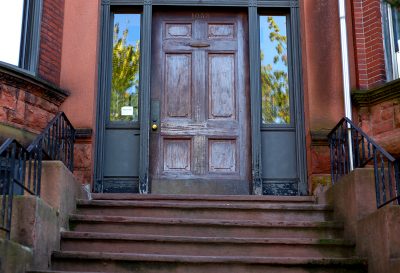
Several Boston University students who experience physical disabilities have shared frustrations with BU’s lack of accessible building entrances, elevators in certain dorms and the Boston University Shuttle.
Mackenzie Pike, a sophomore in the College of General Studies with Hypermobile Ehlers-Danlos syndrome said the condition causes loosened ligaments and joints that can be painful if she walks for an extended period of time.
Pike noted the shuttle causes great inconvenience for those with disabilities trying to use the free service.
“The BU Bus has been incredibly unreliable for me and many other students,” she said. “The [Terrier Transit] app will tell you that it’s coming in five minutes but it won’t come in 15 minutes, or the app will say it’s coming in 10 minutes and then you see it pass you.”
Pike added the issue affects students of all physical abilities.
“[It’s] not only an accessibility issue for disabled students, but people who are low income who can’t afford to buy an MBTA pass,” she said. “Also able-bodied students who get injured need to get on the BUS because they can’t walk on crutches and have to cross campus.”
BU’s Disability and Access Services did not respond directly to requests for comment but deferred to BU spokesperson Colin Riley.
Riley wrote in an email that the unreliability of the Terrier Transit App was brought to the attention of BU Parking by Lorre Wolf, DAS director.
“The app uses GPS information, but city traffic can lead to unanticipated delays,” he wrote.
Pike said after reaching out to DAS, she received a phone call Oct. 5 from Steve Singer, associate dean of students, who she said offered her financial compensation for textbooks rather than addressing accessibility inequities across campus.
“They only talked about money, and it really felt like they were trying to throw money at the issue to shut me up, which I didn’t appreciate,” Pike said.
Pike noted her original email had not mentioned an interest in receiving University funds.
Riley wrote via email the idea that Pike was offered money instead of change is “likely a complete misunderstanding and/or misrepresentation” of the phone call.
“Without addressing an individual case, the Dean of Students office regularly assists students in need, and that assistance (laptop loan, emergency fund, or meal share) is available to any BU student,” Riley wrote. “This week alone, several students have applied for and received emergency assistance.”
Singer said the phone call was simply one of the jobs the Dean of Students office does, where they reach out to students to ask how they can assist and to help minimize the financial challenges they have.
“But if [an email] relates to a student’s financial well-being and things along [those] lines,” he said. “We see what we can do, and we’re calling those students back in many cases, straight away, nights and evenings, to see how we can assist.”
Elizabeth Foster, a third-year graduate student in the School of Theology with Ehlers-Danlos syndrome, said she has had difficulty getting to classes using her rollator walker.
Foster said the College of Arts and Sciences building’s accessibility entrance is located in the back with elevators on the far left side.
“If your class is not close to that side of the building you basically walk all that way [to the elevator] and then you walk all the way back to get to the class,” she said. “It was really ridiculous.”
Foster said the process of requesting official accommodations from professors to be lenient on tardiness can often be difficult.
“I don’t have a lot of control over whether it affects my grades or not, I just have to fear what happens,” she said. “I don’t think it’s anything that anyone is intentionally thinking about doing, but I think it’s hard for people to understand why that happens to disabled students frequently.”
Michelle Eastman, a postgraduate student in the School of Theology with cerebral palsy, said she walks with a limp and shared her concerns with poor accessibility in certain BU buildings.
“I would say the three [older] buildings are the School of Theology, Marsh Chapel and CAS and they all share that [accessibility issue],” she said. “It kind of communicates to the disabled community ‘you’re kind of an afterthought.’”
Eastman additionally pointed out students with disabilities are unable to participate in some events held in the basement of Marsh Chapel as the elevator does not reach the basement.
“They don’t think it’s an issue because they don’t see a lot of people with disabilities but people with disabilities don’t come because there’s not accessibility,” she added. “If there was, more people would come.”
The DAS website states its goal is to support students in accessing and participating in the opportunities available at BU.
Pike said to better achieve this goal, communication with DAS should be renewed into a simpler, handy version, not the current one where students must call to make an appointment.
“I think at DAS, where a lot of people go [with] anxiety, forcing them to make a phone call is not most helpful,” she said.
Eastman said working closely with affected students would be a good opportunity for the school to show its inclusivity.
“I hope that the University would make space to listen to the needs of the students with disabilities,” Eastman said. “I think that goes along with our history of Martin Luther King and Howard Thurman, that this is a place of change and of justice.”




















































































































Robbie Lohnes • Oct 8, 2021 at 12:37 am
What I have noticed across the campus is the lack of hand rails on exterior stairs. Both front stairs and rear stairs ON Bay State Road and Beacon Street as well as Buswell Street. With Winter coming these stairs can be even more treacherous.
I will gladly compile a list as I am all over campus for my job.